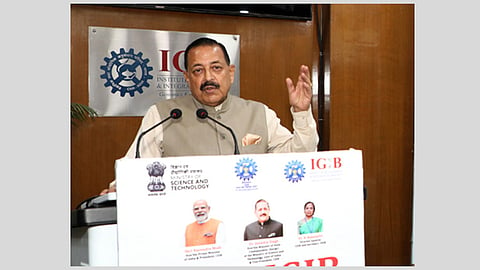

Union Minister of State (Independent Charge) for Science & Technology and Vice President of CSIR, Dr. Jitendra Singh, today inaugurated the state-of-the-art Phenome India “National BioBank” at the CSIR-Institute of Genomics and Integrative Biology (IGIB) in New Delhi.
The launch of this facility marks a major milestone in India’s biomedical landscape, laying the foundation for a comprehensive, long-term health database aimed at enabling precision medicine and personalised treatment strategies for Indian citizens.
Modeled after the UK BioBank but uniquely adapted for India’s vast diversity, the National BioBank will collect detailed genomic, clinical, and lifestyle data from 10,000 participants across the country. The initiative aims to better understand India-specific health patterns and provide crucial insights into complex diseases such as diabetes, cancer, cardiovascular conditions, and rare genetic disorders.
Addressing the scientific community at IGIB, Dr. Jitendra Singh said, “We are moving towards a future where every Indian could receive medical care that is tailored to their genetic profile, lifestyle, and environment. This shift toward personalised healthcare is no longer theoretical—it is being made possible through indigenous innovation.”
He highlighted how India’s unique health challenges, including the high incidence of central obesity—even among individuals who appear lean—call for population-specific research and healthcare interventions. “Our diversity and health conditions are highly complex. This is where the BioBank becomes indispensable. It helps us decode that complexity,” he added.
The Minister also pointed to the rapid progress India is making in frontier technologies like quantum computing, CRISPR-based gene editing, and antimicrobial resistance (AMR) research. He emphasised that the BioBank will support these efforts by generating rich, high-resolution data needed to develop AI-driven diagnostics and gene-based therapies.
Calling for stronger collaboration among research institutions, government departments like the Department of Biotechnology, and private industry, Dr. Singh stressed that “Research must not stay confined to laboratories. It should reach the market and improve lives on the ground.”
The Phenome India Project, under which the BioBank has been launched, is envisioned as a long-term cohort study that will track the health trajectories of individuals over many years. This effort will enable researchers to study disease progression, gene-environment interactions, and treatment responses—all contextualised within the Indian population.
Dr. N. Kalaiselvi, Director General of CSIR and Secretary, DSIR, praised the launch as a pioneering step towards India’s healthcare self-reliance. She described it as a “baby step” with the potential to become a global benchmark. “With its diversity and scale, this data could one day rival or even surpass existing international cohorts like the UK BioBank,” she said.
Dr. Souvik Maiti, Director of CSIR-IGIB, also reflected on the institute’s legacy in genomics. “We were the first institute in India to embark on human genome decoding at a time when sequencing technologies were practically unavailable. This BioBank continues that legacy,” he noted.